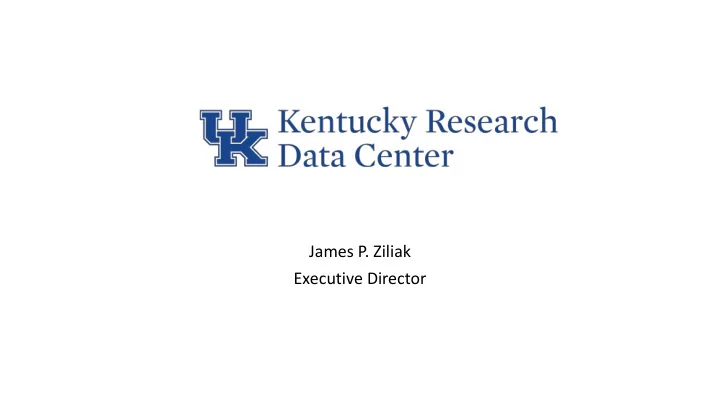

James P. Ziliak Executive Director
What is KRDC? • A member of the Federal Statistical Research Data Centers Network • Qualified researchers with approved projects are provided restricted access to confidential microdata with appropriate safeguards to protect data confidentiality • Inaugural consortium members: University of Kentucky, Indiana University, Ohio State University, University of Cincinnati, and University of Louisville
Data • Census Bureau Data • Economic • Demographic • Combined Economic and Demographic • Other Agencies • National Center for Health Statistics (NCHS) • Agency for Healthcare Research and Quality (AHRQ) • Bureau of Labor Statistics (BLS) • Social Security Administration (SSA) • Housing and Urban Development (HUD) • Centers for Medicare and Medicaid Services (CMS)
Data: Popular Economic Data • Longitudinal Business Database (LBD) • All US establishments with at least 1 employee 1976-2010 • Covers most industries • Possible to aggregate to firm level • Identifies establishment births, deaths, and continuers • Census and Annual Survey of Manufactures (CMS, ASM) • Detailed information about manufacturing establishments • Measures costs and revenues, calculate productivity • Detailed materials and product information • 1963, 1967, 1972-2010 • Economic Censuses (EC) • 1977-2007, every 5 years • Covers most industries at detailed levels • Industry-specific questions on sporadic basis
Data: New Economic Data Products • Integrated Longitudinal Business Database (iLBD) • Merges non-employer with employer (LBD) data • Enhances study of entrepreneurship • Linked Foreign Trade Transactions Database (LFTTD) • Shipment level information for imports/exports • Link to import/export enterprises • Data Recovery Project • Longitudinal Employer-Household Dynamics (LEHD) • Link UI and QCEW data with Census demographic and economic data • Lehd.did.census.gov/led/library/tech_user_guides.html
Data: Demographic • More details than Public Use Files • No top-coding • Uncollapsed variables • Finer geographic detail • Match to external sources • Other public use or macro-level data • Link by geography or PIKs
Data: Popular Demographic Data • Decennial Census (1970-2010) • Short and Long Form data through 2000 (not sample) • May have 1960 soon • American Community Survey • Survey of Income and Program Participation • Current Population Survey • Annual Social and Economic Supplement (March Supplement) • Food Security (December Supplement) • American Housing Survey
Data: Popular Health Data • National Health and Nutrition Examination Survey • National Health Interview Survey • National Survey of Family Growth • Medical Expenditure Panel Survey (can be linked to NHIS) • National Vital Statistics System • National Ambulatory Medical Care Survey • National Hospital Ambulatory Medical Care Survey • National Survey of Long-Term Care Providers • Some files can be linked to CMS claims data, National Death Index, SSI data, and other geocoded data
KRDC Environment: Access Controls • Respondent confidentiality is paramount • Researchers obtain Special Sworn Status • Requires moderate level background check • Oath of confidentiality is for life • Access only via approved equipment • Census employee on-site at all RDCs • Mandatory disclosure avoidance review of all output • Data stripped of SSNs; replaced with a Protected Identification Key (PIK)
KRDC Environment • Analysis • Work conducted ONLY in secure KRDC • Output released electronically after disclosure review • Output should be model-based; tabulations discouraged • Access • 24/7 access • RDC Administrator MUST be on site for NCHS projects • Printing available only when KRDC administrator present • Printouts do not leave the KRDC
KRDC Environment: Collaboration • Each project has “home” RDC • Researchers may collaborate across RDCs • Projects may move “homes” as researchers relocate • KRDC Administrator on-site • Coordinates access across RDCs • Coordinates review of output
Accessing KRDC: Project Proposals • Each agency has its own proposal review and disclosure avoidance review processes • AHRQ meps.ahrq.gov/mepsweb/data_stats/onsite_datacenter.jsp • NCHS www.cdc.gov/rdc/B2AccessMod/ACs220.htm • Census www.census.gov/ces/rdcresearch • BLS (forthcoming) • All projects tracked in Census project management system • In 2017 AHRQ proposals will flow through NCHS
Accessing KRDC: Census Project Proposals • Required for all projects using Census Bureau data • Three stages of review • KRDC Development and Review • Abstract • Proposal • Predominant Purpose Statement • Census Bureau Review • 5 concurrent reviews • Other Agency Review • SSA, BLS, IRS – any agency providing some of the project’s data
Accessing KRDC: Census Project Proposals • Census Project Review Criteria • Scientific merit • Requires non-public data • Provides benefit to Census Bureau programs • Is feasible • Poses no risk of disclosure of individual or business
Accessing KRDC: Benefits to Census Bureau • Helps Census check data it collects, edits, and tabulates • Permits rigorous analysis of confidential data • Tests validity of data processing rules • Evaluates conceptual and processing assumptions • Prepares new economic or population estimates
Accessing KRDC: Benefits to Researchers in FSRDC • Access to restricted-use data • Collaboration across RDCs • Linking multiple data sources • Survey, Census, and Administrative data • Increase analytic power of data
Accessing KRDC: NCHS Project Proposals • Three stages of review • KRDC Development • Researcher directly Submits Proposal to NCHS (AHRQ) • NCHS Review Team • Reviews it for disclosure (not scientific merit nor benefit to NCHS) • RDC analyst • Data representative • NCHS Confidentiality officer • NCHS RDC Director • The review process tends to be back-and-forth where they work together with applicant to determine exactly what they need to answer the question without compromising confidentiality
Accessing KRDC: General Tips on Proposal Process • Allow sufficient time for proposal development and review • Maintain regular contact with local KRDC Administrator • Use available resources • Include all relevant datasets in proposal
Recommend
More recommend